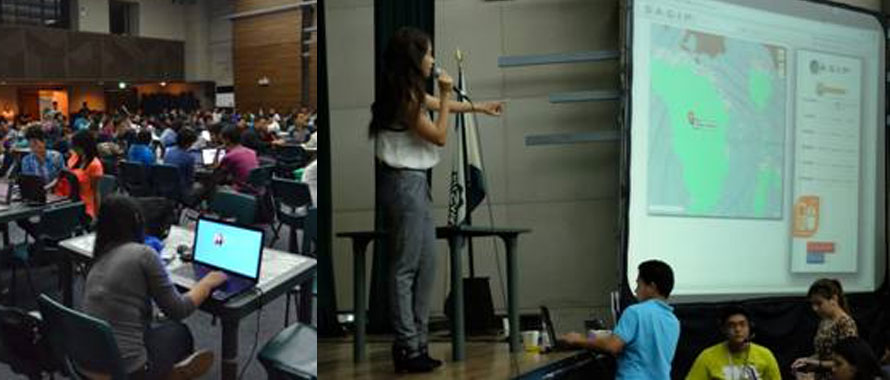In support of the call to build mobile and web solutions for climate change mitigation and adaptation, Chikka opened its SMS API to the hundreds of developer participants at the first-ever Hack the Climate in Manila, an eco-themed hackathon held at the De La Salle College of Saint Benilde.
The Chikka SMS API (https://api.chikka.com), the first in a suite of APIs (Application Programming Interface) the company is releasing, enables developers to seamlessly integrate SMS functionalities into their web and mobile applications. As the only open SMS API platform in the country with tri-telco support, the Chikka SMS APIgives app owners another practical channel to reach its users, via SMS to any Philippine mobile.
“In the Philippines, where as of the moment only about 15 percent of the population are smartphone users, SMS can still be most reliable in times of disaster when information dissemination is crucial,” said Junie Agcaoili, Corporate Communications Director for Chikka.
“Now, when combined with web solutions and today’s mobile apps, their reach and effectiveness become greater. That is the power of the Chikka APIs,” he noted.
This echoes the sentiments of Jacob Scheer and Miguel Lachanski, fellow Princeton University juniors, who brought Hack the Climate to the Philippines after seeing the devastating impact of climate change in the aftermath of Typhoon Yolanda. The two “eco-hacktivists” also recognized that the country’s thriving developer community can help in easing the effects of one of the biggest problems of the world today. With a grant from Davis Projects for Peace through the Pace Center for Civic Engagement, Scheer and Lachanski worked hand-in-hand with the Smart Developer Network and other tech advocates in initiating a potentially record-breaking 56-hour hackathon.
Hack the Climate was a big success both in increasing the awareness of young developers regarding environmental issues and in providing a venue for the creation of applications aimed to help solve or mitigate them.
The top honor in the hacking competition went to Tanaw, a web-based geo-locating app by Team Instigator that monitors reforestation sites in the Philippines, as well as promotes our top tourist destinations. At second was Agila, a cloud-based application created by Team Superuser that tracks a person’s energy usage and carbon footprint.
Meanwhile, the app Sagip by Team Maligaya successfully made use of the Chikka SMS API and showcased text messaging as a significant means of communication in battling natural disasters and in promoting environmental campaigns. Sagip provides real-time satellite-based weather updates as well as information on different programs on saving the country’s natural resources.
“As a company committed to giving Filipinos a more empowered life,Chikka supports initiatives that encourage people to take action in solving our country’s problems,” said Chikka CEO Chito Bustamante.
Since the release of its Chikka Text Messenger in 2000, the company has been finding ways to help the millions of global Filipinos to connect with their families back in the Philippines for free.
Just like the organizers of Hack the Climate, the company challenges the new generation of problem-solvers, the new breed of developers, to continue working together to improve the lives of Filipinos. It also hopes that with the release of the API, they will be able to help bridge the gap between the connected and the still Internet-less majority.
“For more than a decade, we’ve seen great things happen when people can freely communicate with each other via our SMS system. Now, we have opened up these APIs, for others to do even greater things with it,” noted Bustamante.
Chikka is a subsidiary of the Philippines’ largest telecommunications group PLDT-Smart Communications.


